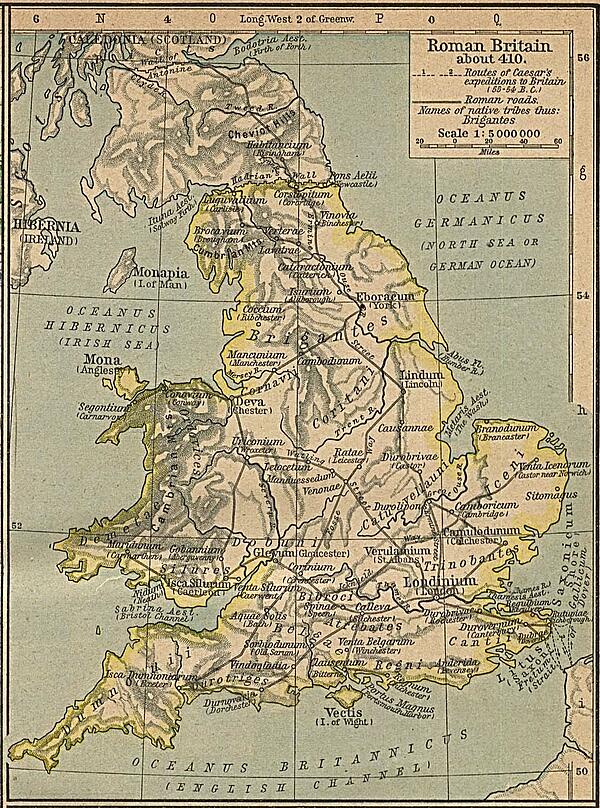Ancient Briton and Roman Place Names
When the Romans first landed in Britain in AD 43, they discovered that the island was inhabited by tribes of Celts. As the Celts had come to England in waves, there was no uniformity to the language; some spoke a Brittonic/Brythonic dialect while others spoke with a Goidelic dialect. The former developed into the Breton/Welsh languages while the latter into the Gaelic language. The Romans then began to record all English place names in Latin, which has made it difficult to identify the original place names. Despite this, Ancient Briton and Roman place names have survived in towns and cities across Britain.
- London was known as Londinium by the Romans, which translates as ‘the town of Londinos’.
- Reculver in Kent was known as Regulbium, which meant ‘headland’.
- Dover was known as Dubris, which translated to ‘water’ in Celtic but was a reference to the River Dour rather than the English Channel.
- Lincoln was known as ‘Lindum’, though at some point during the Roman occupation the word ‘colonia’ (colony) was added. The modern spelling of Lincoln is a combination of the two – Lin and Col.
- Carlisle was known as Luguvalium, which meant ‘Luguvalo’s Place’, which may have been as a result of the war-god Lugus or a reference to the Celtic leader Lugovalos.
- York’s Celtic name was Eboracum. It is thought that the first leader of the land that surrounded York was Eburos. Later settlers changed the name to Eoforwic (which meant boar farm) but it's name was changed frequently by subsequent invaders, with the Danes called it Jorvik. The name York was first used in the 13th century.
- Leeds was known as Loidis and translated as ‘district by the river’.

Most towns that ended with -ceter, -chester, or -caster referred to former Roman military towns (Chester and Colchester being the two most obvious). The Old English word ‘ceaster’ is believed to have derived from the Roman ‘castra’, which meant camp. However, this is not true for all towns that end with these letters. Grantchester, for example, has an Anglo-Saxon background.
There are some place names have some form of ‘cester’ or ‘chester’ at the end of them but still have a meaning in themselves. Gloucester derives from ‘Glevum, for example, which means ‘bright place’. Meanwhile, Worcester means ‘chief town of the Wigoran tribe’.
Other Roman place names include Chester, which was also known as ‘Civitas Legionum’ or ‘City of the Legions’. This was later abbreviated to ‘Legionum’ and by the eleventh century this had changed to ‘Ceaster’. Exeter also has a Celtic origin. It meant ‘town on the Exe’, though the river was originally called the Isca (water).
A number of other British towns with a Celtic origin also have links to a nearby river including Lancaster, which was named as a result of the nearness of the River Lune (‘health-giving’) and Frocester the River Frome (‘brisk one’). Colchester was also named after a river, having been built near the River Colne, but no one is sure why the river was called the Colne in the first place.
Salisbury and Lichfield have Celtic origins but with an English suffix. Salisbury started as 'Sorviodunum', which has been translated as ‘Sorbio’s Fort’. The Saxons removed the second part of the name ‘dunum’ and replaced it with ‘bury’, which then led to the spelling changing to ‘Searobyrg’. The Normans then changed this to Salesbiri by the thirteenth century. Lichfield originally meant ‘grey wood’ (Letocetum). This was a near correct translation of the Celtic as Liccid meant ‘grey wood’, while feld was added to indicate the open land that existed just outside of Lichfield.
Unlike elsewhere in the UK, many places in Cornwall – where the Romans had very little long-term impact maintain place names with a clear Celtic origin. Bodmin, for example, means ‘house of monks’. Penzance means ‘holy headland’ and Cambourne ‘crooked hill’. Those Cornish towns that start with ‘Perran’ commemorate St. Peran, and Looe means ‘inlet by the sea’.
Many river names in England also have a Celtic origin. Some including as the Wear, Don, Avon, Axe, Exe, Esk, Usk and Wiske are derived in some part from ‘water’ or ‘stream’. However, the Thames, Thame and Tame are all derived from the word ‘dark’. The Trent and Tarrant both come from the Celtic to trespass and indicate that both rivers had a reputation for flooding, while, the rivers Leven, Lymn and Leam all derive from the word ‘elm’ while the Derwent and Darwen derive from ‘oak’.
See also:
Norman Place Names in England
Norman Place Names
The Origin of Place Names
Anglo-Saxon Place Names
The History of County Names
MLA Citation/Reference
"Ancient Briton and Roman Place Names". HistoryLearning.com. 2026. Web.
